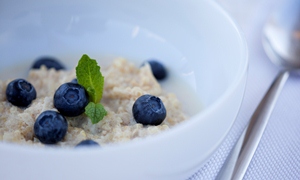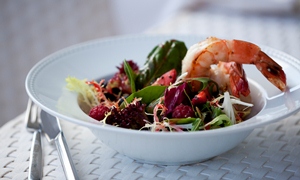Nutrition Tips for Healthy Eating

Healthy eating combined with regular exercise is the best way to look and feel healthy inside and out. There are a lot of different healthy eating diets available to try on a nutrition friendly retreat including juice detoxing, alkaline, raw, macrobiotic or an Ayurvedic diet, but despite their differences the same principle rules for eating healthily usually apply. There is no need to cut out your favourite foods to help you lose those pesky pounds, simply follow our advice below and know that cutting out some foods altogether can actually be bad for you.
A very important nutrition tip is to start the day with breakfast because during the night your metabolism slows down. Eating in the mornings means you are boosting it which gives you more energy for your day ahead. So never skip breakfast or you may find yourself snacking during the day.
Here are some examples of healthy breakfasts:
- A bowl of high fibre cereal, oats or two shredded wheat with skimmed milk or low fat yogurt and a handful of blueberries, with a glass of freshly squeezed juice.
Foods with fibre in help you feel fuller for longer, so by eating a high fibre cereal in the morning, you'll be less likely to want to snack before lunch. Blueberries are also a super-food and so eating them with breakfast will give you some of those key nutrients to start your day.
- A boiled egg with two pieces of wholemeal toast and low fat margarine, a cup of green tea or a glass of water or milk.


Eggs are full of protein, therefore an egg or two for breakfast helps sustain your energy levels throughout the day. Green tea is an incredibly healthy drink as it's packed with antioxidants and has lots of health benefits; milk is also an option as it's full of important vitamins.
When you're hungry and you need to eat something, you usually take large mouthfuls just out of instinct but eating smaller mouthfuls will make the meal seem longer therefore making you feel fuller faster. Eating on smaller plates can help you eat less because when you serve up a meal you usually feel the need to finish what is on your plate, so by eating on a smaller plate, there'll be less food on the plate for you to finish, and 9 times out of 10 you won't be wanting seconds.
The frequency of meals you have in a day is also important. Everyone should have five to six meals a day and in smaller portions because it's better for you than three large meals; eating large meals can make you feel lethargic whereas smaller meals give you more balanced energy throughout the day. This would include breakfast, lunch and dinner and no more than three healthy snacks in between, which would lead to having smaller lunches and dinners. The times that you eat should try to be the same each day:
7:00am - A sizeable breakfast, perhaps an egg and two pieces of wholemeal toast.
10:00am - A small snack, maybe a handful of nuts or raisins.
1:00pm - Lunch - a sandwich and a piece of fruit.
4:00pm - Carrot sticks and humus for a nice healthy snack.
7:00pm - Dinner - something small like a baked potato and some vegetables.
If the need for desert arises indulge in some fresh fruit.

The human brain takes up to 20 minutes to realise when you are full and so if you take less than 20 minutes to eat your food which most of us do, you can eat and eat but not feel completely full until you have eaten too much. Therefore it's recommended to stop eating when you're 70% full instead of 100% because after eating your body is still digesting food. Chewing your food more is also a good way of feeling fuller as digestion of food starts in your mouth and the act of chewing alerts the rest of the body to start the digestion of processing the food more quickly.
Having a healthy balanced diet is largely about eating a variety of foods and in moderation. A balanced diet should contain a mixture of fruit and vegetables, carbohydrates such as bread, rice potatoes and pasta, dairy foods, sources of protein like meat, fish and eggs and fatty or sugary foods, which, makes up the smallest amount of a balanced diet. Too much and too little of each part can be bad for you and can lead to malnutrition so it's important to eat each in proportion.
Of course to lead a healthy lifestyle, exercise should be included with healthy eating so try to do 30 minutes of moderate exercise five times a week to feel healthy not only on the inside but the outside too.
Talk to one of our Travel Specialists on 0203 397 8891 or contact us here to discuss tailor-making your perfect healthy holiday.
